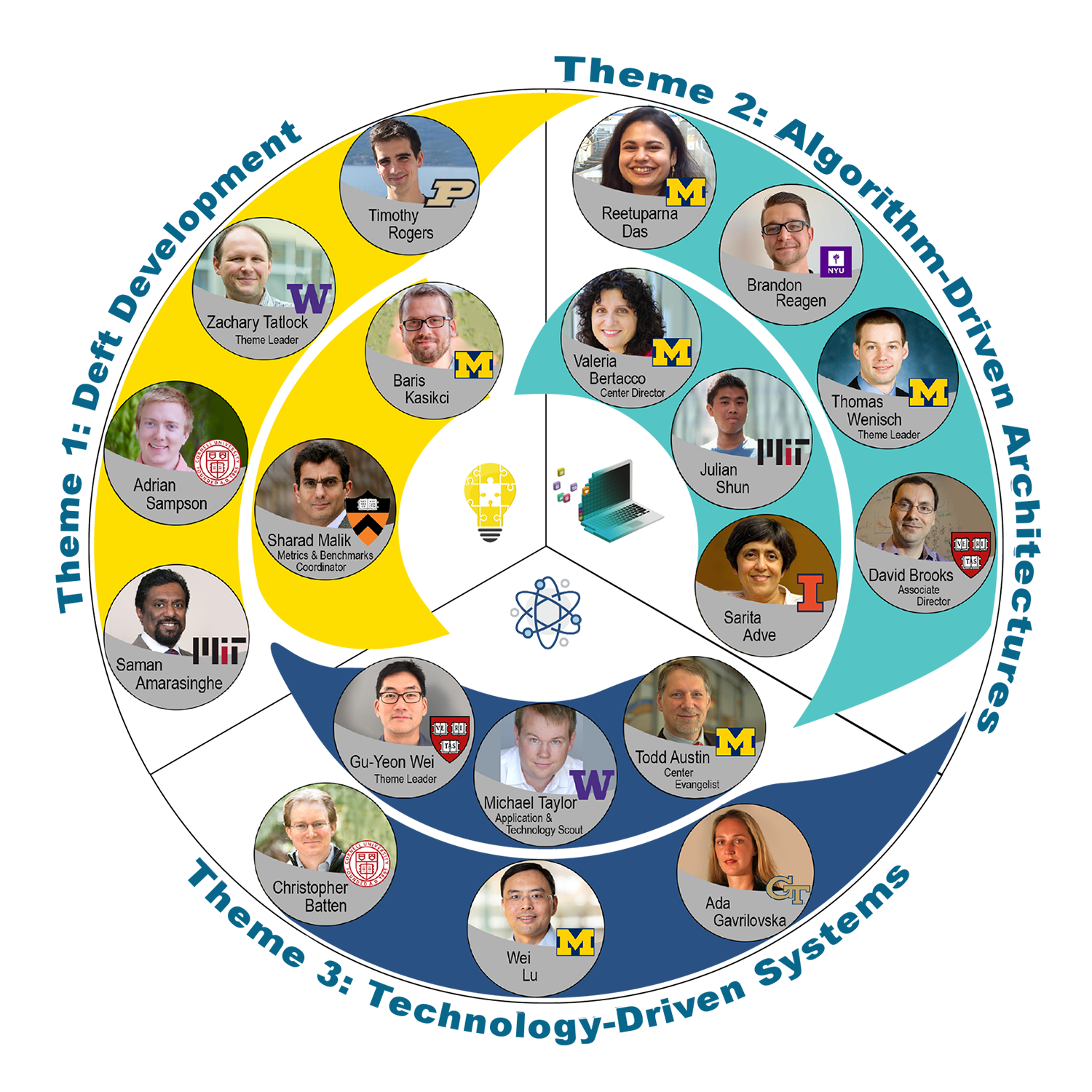
Theme 1
- Deft Development
Theme 2
- Algorithm-Driven Architectures
Theme 3
- Technology-Driven Systems
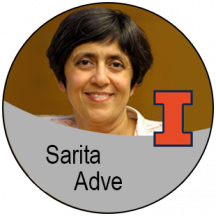
Sarita Adve is the Richard T. Cheng Professor of Computer Science at the University of Illinois at Urbana-Champaign. Her research interests are at the hardware-software interface and her work has spanned computer architecture, programming languages, operating systems, and applications. Adve received the Ph.D. in Computer Science from Wisconsin in 1993 and a B.Tech. in Electrical Engineering from IIT-Bombay in 1987.
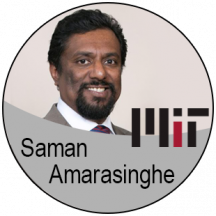
Saman Amarasinghe is a Professor and Associate Department Head in the Department of Electrical Engineering and Computer Science at MIT. He leads the Commit compiler research group in MIT’s Computer Science & Artificial Intelligence Laboratory (CSAIL). Amarasinghe received a bachelor’s degree from Cornell University in 1988, a master’s degree and PhD in electrical engineering from Stanford University in 1990 and 1997 respectively, and joined MIT as an assistant professor in 1997.

Todd Austin is a Professor of Electrical Engineering and Computer Science at the University of Michigan in Ann Arbor. His research interests include computer architecture, robust and secure system design, hardware and software verification, and performance analysis tools and techniques. Austin received his PhD in Computer Science from the University of Wisconsin in 1996.
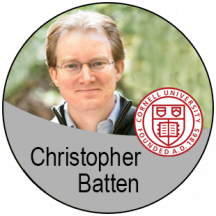
Christopher Batten is an Associate Professor of Electrical and Computer Engineering at Cornell University, specializing in computer architecture and VLSI design. His research interests include energy-efficient programmable accelerators, parallel programming frameworks, and productive chip-design methodologies. Batten received a PhD in EECS from the Massachusetts Institute of Technology, an MPhil in Engineering from the University of Cambridge, and a BS in EE from the University of Virginia.

Valeria Bertacco is Arthur F. Thurnau Professor of Electrical Engineering and Computer Science and Associate Dean in the Rackham Graduate School at the University of Michigan. Her research interests are in computer design, with emphasis on specialized architecture solutions and design viability, in particular reliability, validation and hardware-security assurance. She received her M.S. and Ph.D. degrees in Electrical Engineering from Stanford University and a Computer Engineering degree from the University of Padova, Italy.
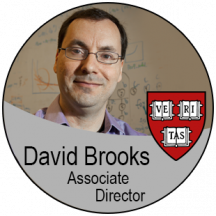
David Brooks is the Haley Family Professor of Computer Science at Harvard University. He received his B.S. in Electrical Engineering at the University of Southern California and M.A. and Ph.D. degrees in Electrical Engineering at Princeton University. His research interests include computer design at the hardware-software interface.
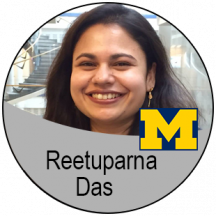
Reetuparna Das is an Assistant Professor at the University of Michigan. Prior to this, she was a research scientist at Intel Labs and the researcher-in-residence for the Center for Future Architectures Research. Some of her recent projects include in-memory architectures and custom computing for precision health and AI. She has received IEEE Top Picks awards, an NSF CAREER award, CRA-W's Borg Early Career Award, and a Sloan Foundation Fellowship. Professor Das has been inducted into the IEEE/ACM MICRO and ISCA Hall of Fame. She also serves as the co-founder and CTO of a precision medicine start-up, Sequal Inc.
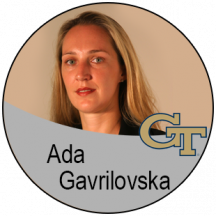
Ada Gavrilovska is an Associate Professor in the School of Computer Science at Georgia Tech, where she also completed her PhD in 2004. She directs the Kernel research group, which focuses on performance, scalability and efficiency problems across the systems software stack, including operating, distributed, and high-performance computing systems. Her research is driven by emerging hardware technologies, such as new types of memories and accelerators, and by new application classes, such as the ones shaping edge computing.
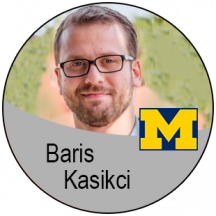
Baris Kasikci is an assistant professor in the Electrical Engineering and Computer Science Department at the University of Michigan. His research is centered around developing techniques, tools, and environments that help developers build more reliable, secure, and efficient software. He completed his PhD in the Dependable Systems Laboratory at EPFL.

Wei Lu is a Professor in the Electrical Engineering and Computer Science department at the University of Michigan and Director of the Lurie Nanofabrication Facility. His research interest includes resistive-random access memory (RRAM) devices, RRAM-based logic circuits, neuromorphic computing systems, and electrical transport in low-dimensional systems. He is an IEEE Fellow, a recipient of the NSF CAREER award, and co-founder of Crossbar, Inc.
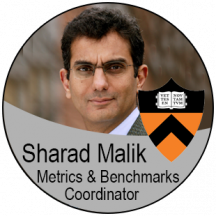
Sharad Malik is the George Van Ness Lothrop Professor of Engineering and the Chair of the Department of Electrical Engineering at Princeton University. His research focuses on design methodology and design automation for computing systems. His research in functional timing analysis and propositional satisfiability has been widely used in industrial electronic design automation tools.
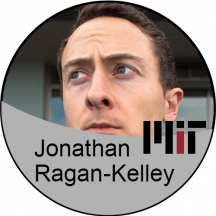
Jonathan Ragan-Kelley is Esther and Harold E. Edgerton Assistant Professor of Electrical Engineering & Computer Science at MIT. He works on high-efficiency visual computing, including programming languages, compilers, and systems for image processing, vision, 3D rendering, simulation, and machine learning. He received a bachelor's degree in Computer Science from Stanford University in 2004, and his master's and PhD in Electrical Engineering & Computer Science from MIT in 2007 and 2014.

Brandon Reagen is an Assistant Professor in the Department of Electrical and Computer Engineering with affiliation appointments in the Computer Science. He earned a PhD in computer science from Harvard in 2018 and received his undergraduate degrees in computer systems engineering and applied mathematics from the University of Massachusetts, Amherst, in 2012.

Timothy Rogers is an Assistant Professor in the School of Electrical and Computer Engineering at Purdue University. He is interested in exploring architectures and software systems that improve performance, energy-efficiency, and programmer productivity. His ongoing research includes work in massively parallel microarchitecture, modeling programmable accelerators and investigating full-stack solutions for a future where problems continue to scale, but transistors do not. Rogers completed his Ph.D. at the University of British Columbia and holds a bachelor's degree in Electrical Engineering from McGill University.
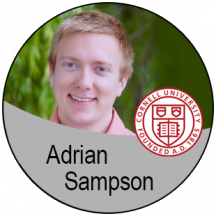
Adrian Sampson is an assistant professor in the computer science department at Cornell University. He works on programming languages, computer architecture, and the abstractions that separate them. He sees approximate computing as an instance of a broader breakdown of airtight distinctions between hardware and software concerns. Adrian graduated from the University of Washington in 2015 and from Harvey Mudd College in 2009.

Julian Shun is an Assistant Professor of Electrical Engineering and Computer Science at MIT. He obtained a Ph.D. in Computer Science from Carnegie Mellon University and an undergraduate degree in Computer Science from UC Berkeley. He is interested in the theory and practice of parallel computing, especially parallel graph processing frameworks, algorithms, data structures, and tools for deterministic parallel programming.

Zachary Tatlock is an Assistant Professor in Computer Science and Engineering at the University of Washington where he is a member of the Programming Languages and Software Engineering (PLSE) group. He received his PhD from UC San Diego and BS from Purdue. His research draws upon proof assistants, SMT solvers, and type systems to improve software reliability and security in domains ranging from distributed systems and compilers to numerical approximation and web browser security.

Michael Bedford Taylor is a professor in both the CSE and EE departments at the University of Washington. His research interests includ ASIC Clouds, open source hardware, dark silicon, tiled multicore architecture, HLS accelerators for mobile, and Bitcoin mining hardware. Taylor received a PhD in Electrical Engineering and Computer Science from the Massachusetts Institute of Technology.

Gu-Yeon Wei is Robert and Suzanne Case Professor of Electrical Engineering and Computer Science at Harvard University and currently serves as Area Chair for Electrical Engineering. He received his BS, MS, and PhD degrees in Electrical Engineering from Stanford University. His research interests span multiple layers of a computing system: mixed-signal integrated circuits, computer architecture, and design tools for efficient hardware.

Thomas Wenisch is an Associate Professor of Computer Science and Engineering at the University of Michigan, specializing in computer architecture. His ongoing work focuses on algorithmic accelerators, data center architecture, memory persistency, and accelerators for medical imaging. Wenisch received his Ph.D. in Electrical and Computer Engineering from Carnegie Mellon University.

Lisa Wu Wills is the Clare Boothe Luce Assistant Professor of CS and ECE at Duke University. Prior to Duke, she was a postdoctoral researcher at the University of California, Berkeley and a research scientist at Intel Labs. Her research interests include computer architecture and microarchitecture, accelerators, emerging applications in big data such as database and graph analytics, healthcare such as genomics analytics, and artificial intelligence such as natural language processing for drug discovery. Wills has a PhD in computer science from Columbia University. She has received three IEEE Micro Top Picks, an NSF CAREER award, and a MICRO best paper award.